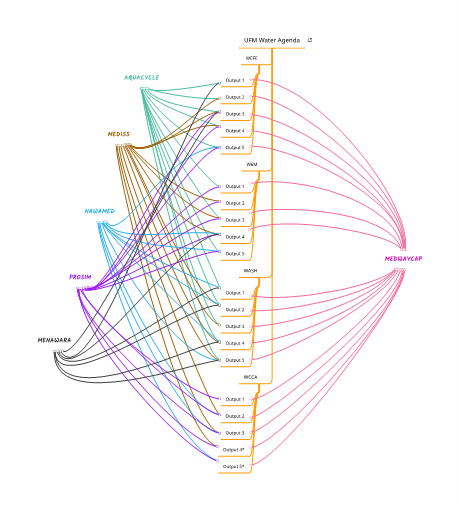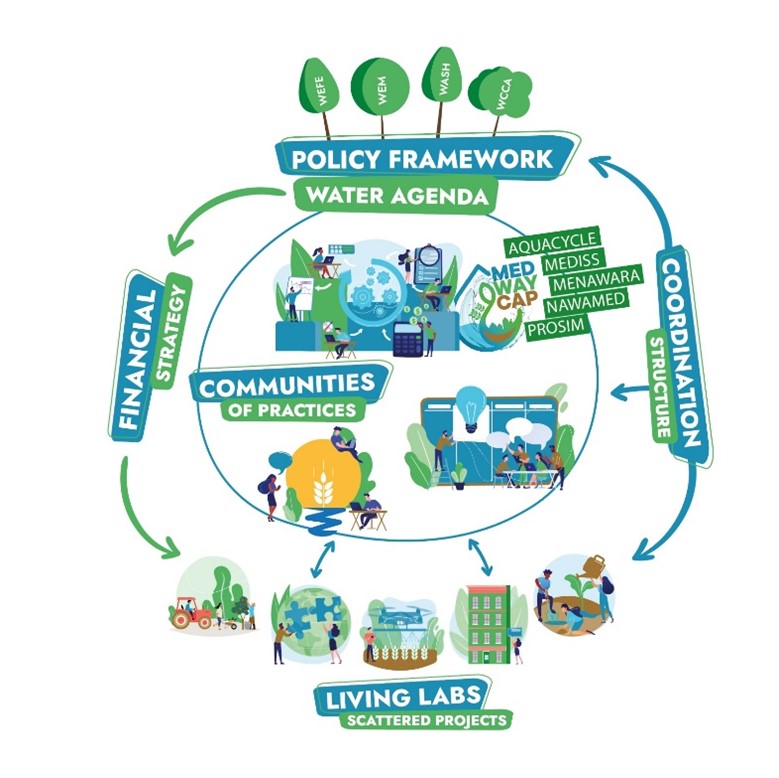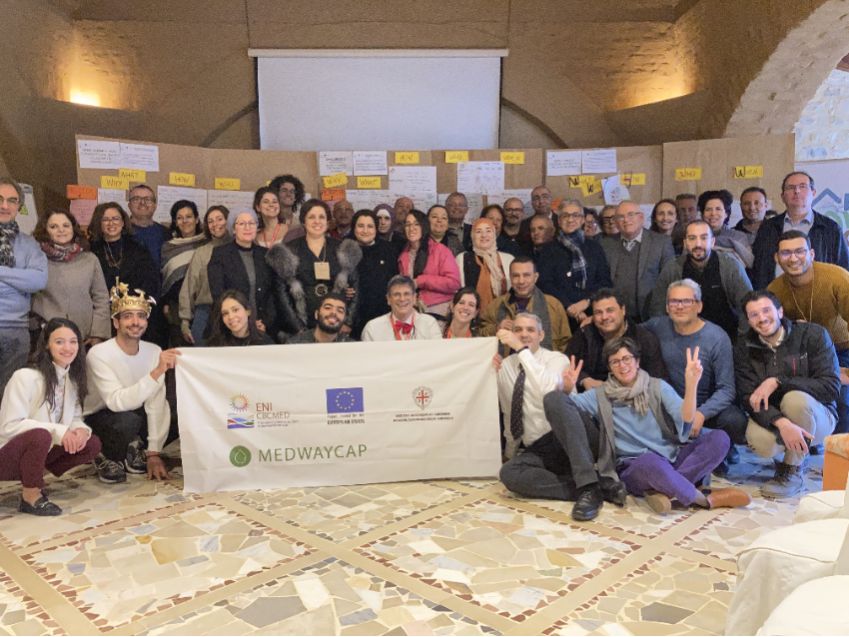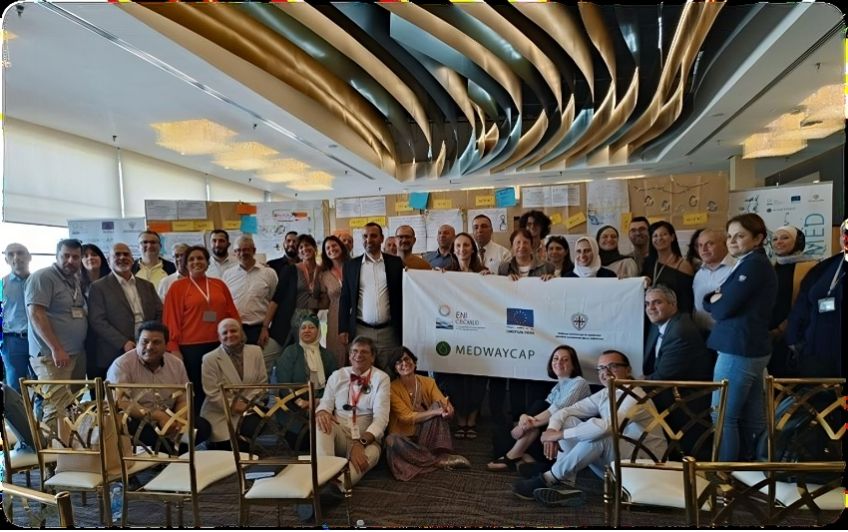MEDWAYCAP: from EU project to Mediterranean Alliance
Water availability in the Mediterranean basin is limited – mainly dependent on runoff from mountain areas and therefore the area is one of the most vulnerable to “water crisis”. Meanwhile, most countries on the Southern and Eastern shores of the Mediterranean are in “water stress”, with less than 1,000 m3/capita/year. Climatic changes, population growth and human activities (agriculture, tourism and industrial development) directly affect water availability. Despite some encouraging progress, current water-use efficiencies in the drinking water and irrigation sectors still represent a challenge for the area. As a matter of fact, improving water efficiency, with a particular focus on agriculture, as well as increasing water supply through non-conventional water resources, are among the utmost priorities for the Mediterranean region.
The MEDWAYCAP project, funded by the European Union under the ENI CBC Mediterranean Programme, addresses how to adopt Non-Conventional Water Reuse (NCWR) and management at the domestic and agricultural levels in the Mediterranean region by promoting sustainable strategies and technological innovations. This is the first ever capitalisation project of the ENI CBC MED programme on Water Efficiency, which has the following objectives: (a) knowledge transfer and enhancement (b) initiation of new and strengthening and leveraging of existing networks and alliances (c) awareness raising among public authorities and policy-makers on NCWR measures and related opportunities for policy planning and corresponding financing measures. Specifically, MEDWAYCAP capitalises the key outputs of the standard ENI CBC MED projects listed here, which contribute to achieving the goals of the Union for Mediterranean (UfM) Water Agenda:
- AQUACYCLE: Towards Sustainable Treatment and Reuse of Wastewater in the Mediterranean Region.
- MENAWARA: Non-conventional Water Re-use in Agriculture in Mediterranean Countries.
- NAWAMED: Nature-Based Solutions for Domestic Water Reuse in Mediterranean Countries.
- MEDISS: Mediterranean Integrated System for Water Supply.
- PROSIM: Promoting Sustainable Irrigation Management and non-conventional water use in the Mediterranean.
- MAIA-TAQA: Mobilising new Areas of Investments and Together Aiming to increase Quality of life for All.
How did MEDWAYCAP address the challenge of water treatment and reuse at Mediterranean level?
By capitalising on the results of standard projects and the fragmented and rich experiences of the region and boosting the implementation of a sustainable strategy to address the challenge of water treatment and reuse at the domestic and agricultural levels. Moreover, a thorough analysis of the results achieved by each standard project was conducted which allowed to assess the scope and nature of their contribution to the different priorities and outputs of the UfM Water Agenda (WASH-Water and Sanitation Hygiene; WEM-Water Employment Migration; WCC-Water & Climate Change actions; WEFE: Water-Energy-Food-Ecosystem Nexus)
Figure 1 below shows how significantly all of these implemented projects support the Water Agenda. Nonetheless, MEDWAYCAP was able to create synergies and complementarities that allowed the various outcomes to feed into the UfM Water Agenda, strengthening its impact and reach.

Fig.1 - The contribution of each standard project compared to the MEDWAYCAP’s contribution to the UfM’ s Nexus-based Water Agenda.
Where:
- Output 1 is Nexus-related challenges and solutions identified and prioritised, at different geographical scales.
- Output 2 is Nexus governance settings strengthened, at difference geographical scales.
- Output 3 is Planning, and implementation of Nexus solutions enabled, at different geographical scales.
- Output 4 is Knowledge shared and capacity built on Nexus methodologies, policies and technologies.
- Output 5 is Demonstration applications implemented as means for knowledge sharing.
- Output 4* is Capacity building on Climate Change Adaptation methodologies, policies and technologies.
- Output 5* is Knowledge sharing via success stories and demonstration applications implemented
MEDWAYCAP approach to capitalisation
A structure and mechanism (Figure 2) is proposed to establish cross-connections between the various initiatives, policies and activities in the Mediterranean. This will eliminate silos and support extensive cross-fertilisation, enabling greater positive impact on the water sector and related dimensions at the regional level.
The most important action is to create the necessary structures to link these high-level policy frameworks with the Communities of Practice - CoPs working in the water sector and to expand collaboration among CoPs. This horizontal expansion will allow a more solid bond with a higher level of decision-making for the future development of the Mediterranean Water Management Framework. From this perspective, facilitating a bottom-up process is a prerequisite that will lead to the following:
a) Facilitating horizontal relations/communication between insiders of the same-role (technicians, directors, experts, etc.) across the MED countries.
b) Strengthening capacity building activities involving experts, stakeholders, and the general public within the Living Labs (LLs).
c) Establishing a common discussion venue for the Mediterranean Community of Practice to create links with high-level EU decision-makers, technology, and market experts within the current legal framework.
MEDWAYCAP is itself a validated model of how a horizontal CoP can be established and demonstrates its relevance in harmonising policy and financial initiatives to strengthen the impact and value of innovative integrated solutions for Non-Conventional Water management at domestic and agricultural level. The different standard projects capitalised addressed the same NCWR theme; each of them is a potential LL with specificities. The capitalisation project allowed communication and exchange of experiences between these different labs, which led to the activation of a CoP i.e., the capitalisation project consortium (Fig. 2).

Fig.2 - The process and the mechanism for Capitalisation developed in MEDWAYCAP
Mediterranean Alliance – Memorandum of Understanding
MEDWAYCAP’s findings show how a MED capitalisation alliance is strategic to meet the challenge of a sustainable capitalisation strategy and promote change. The creation of a Mediterranean alliance involving researchers, practitioners, public officials, institutions, and the private sector is imperative to ensure sustainable capitalisation of Best Practices (BPs) and their replicability in the Mediterranean region and beyond. It is a collective learning tool that should enable more effective policies aligned with investment channels and thus more relevant innovation processes. Project partners (PPs), Associated partners of MEDWAYCAP and relevant Stakeholders participating in the Innovation Camps in Tunisia (Fig. 3) and Jordan (Fig. 4), discussed, interacted, and identified the main challenges along the path for fostering change in the Mediterranean: “Structuring the way to implement a sustainable capitalisation strategy that spans Best Practices and an Enabling Environment” is the broad challenge.

Fig. 3 - 1st Innovation Camp, GDA Sidi Amor, Tunisia, 7-8 February 2023

Fig. 4 - 2nd Innovation Camp, Amman, Jordan, 9-10 May 2023
The MEDWAYCAP BPs Inventory platform which takes into account the exploitation ecosystem, is an efficient tool for sharing expertise and supporting decision-making. The analysis component of the BPs database identifies trends and gaps and is used to guide policy and funding.
In this context, a Memorandum of Understanding (MoU) was launched in Barcelona, Spain during the MEDWAYCAP Final Conference, endorsed by the ENI CBC “Mediterranean Sea Basin Programme” (ENI CBC MED), the Union for Mediterranean (UfM), the PRIMA Foundation - Partnership for Research and Innovation in the Mediterranean Area, the Association of the Mediterranean Chambers of Commerce and Industry (ASCAME) & the Global Water Partnership - Mediterranean (GWP-Med) and entered into force on July 12, 2023. The MoU, which is an integral part of the capitalisation strategy, aims to strengthen the impact and value of the participatory and inclusive process that delivers the innovative integrated Non-Conventional Water solutions through a Mediterranean alliance committed to a long- term capitalisation strategy at the Mediterranean level. It can be renewed by signing a joint addendum setting additional terms and conditions and shall be supported by future funded projects/initiatives forming a new CoP in the region targeting NCWR to continuously support experience sharing and strategy development at the regional scale.
link: https://www.theparliamentmagazine.eu/news/article/the-stepping-stone-to-an-alliance-for-a-longterm-capitalization-strategy-for-the-reuse-and-management-of-nonconventional-water-at-the-mediterranean-level?fbclid=IwAR2byZItPpOqN9QdU5u3_j84WkyBJQ8QbU7qhULcXhMoCu2ihng1jVmipBI






